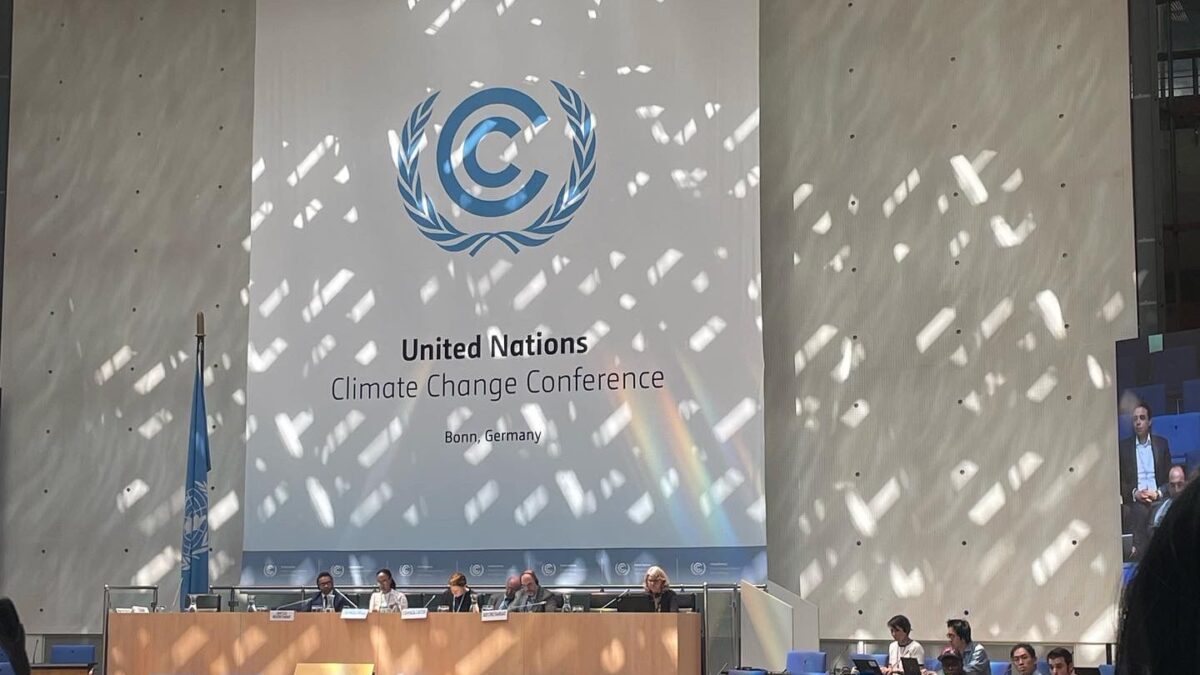In June, Ireland’s two Climate Youth Delegates, Oileán Carter Stritch (2022-2023) and Jennifer Salmon (2023-2024), travelled to Bonn, Germany to attend the Subsidiary Body for Scientific and Technological Advice and the Subsidiary Body for Implementation (SB58) of the United Nations Framework on Climate Change (UNFCCC). Below, Jennifer has reflected on her experience and shared some key takeaways.
Reflections on UN Climate Change Conference – Jennifer Salmon

The Four People at SB58 Conference in Bonn
When I returned from SB58, I thought about the fight for climate justice in respect of UNFCCC processes and how it reminds me of a story I was told as a child; a story about four people named Everybody, Somebody, Anybody and Nobody.
There was an important job to be done and Everybody was sure that Somebody would do it.
The fight for climate justice intensifies every day. On the 7th of July, the world’s average temperature reached a new high for the third time in a week (17.23ºC). Human-induced change to our planet was discussed at length in Bonn, particularly in preparation for the Global Stocktake which is set to occur at COP28, reporting on where we are at right now. At SB58 it was reported that there needs to be a 48% reduction in emissions to meet the Paris Agreement 1.5º. There is an important job to be done and Everyone is sure that Somebody will do something about it. However, the climate crisis will not be ameliorated by individual efforts alone.
Anybody could have done it, but Nobody did it. Somebody got angry about that, because it was Everybody’s job.
At several plenaries and talks at SB58, it was established by representatives from every country that the existing science, research, reports and agreements on climate are generally accepted. Any country can do it. Any country can make systematic changes and be a leader in a just transition away from fossil fuels. It’s Everybody’s job and those who are suffering right now are justifiably angry. Those who are contributing the least to the climate crisis are suffering the most and yet were the least represented at SB58 with visa issues, cost barriers etc.
Everybody thought Anybody could do it, but Nobody realised that Everybody wouldn’t do it.
For meaningful change to happen, it has to be systematic and it has to be Everybody. At SB and COP plenaries and negotiations, if the delicate geopolitical situation cannot be dealt with, Everybody will not do it and no systematic changes will be made. Furthermore, we need to be listening to those who know their land and communities best. Indigenous knowledge holders have often been overlooked in UNFCCC discussions and processes.
At SB, Oileán and I attended a panel of indigenous knowledge holders speaking on Loss and Damage. The panel was noted to be the first time that an indigenous person from each of the UN regions had gathered and had a conversation. How has it taken 28 conferences to bring together and listen to those who are most in tune with our planet?
A member of the audience who works for the technical support team of the Transitional Committee encouraged the speakers to provide their stories as case studies to feed into their process. However, this in itself ignores the sensitive nature of indigenous culture. Speakers flagged that they would not feel comfortable sharing case studies like this due to the sensitive nature of certain practices; indigenous knowledge holders are an asset for their connection to earth, not people to reduce to case studies. Nobody realised that Everybody couldn’t do it without engaging principles of equity to ensure that every voice is amplified and enabled to engage in the UNFCCC process.
It ended up that Everybody blamed Somebody when Nobody did what Anybody could have.
Heading towards the 28th conference of parties, who will we blame when meaningful, systematic action is not taken? How much longer will it be before the urgency and prevalence of the climate crisis is realised? Given the significant presence of oil leaders at COP28, it becomes increasingly challenging to refrain from frustration and to resist placing blame.
Time has run out. We cannot rely on Everybody, Somebody, Anybody and Nobody. We don’t have time to wait, action needs to be taken. UNFCCC conferences have been widely criticised as talk shops.
There is an important job to be done and I want to feel hope that everybody will work to do it before it is too late. It’s time to stop the paralysis of analysis and act now.